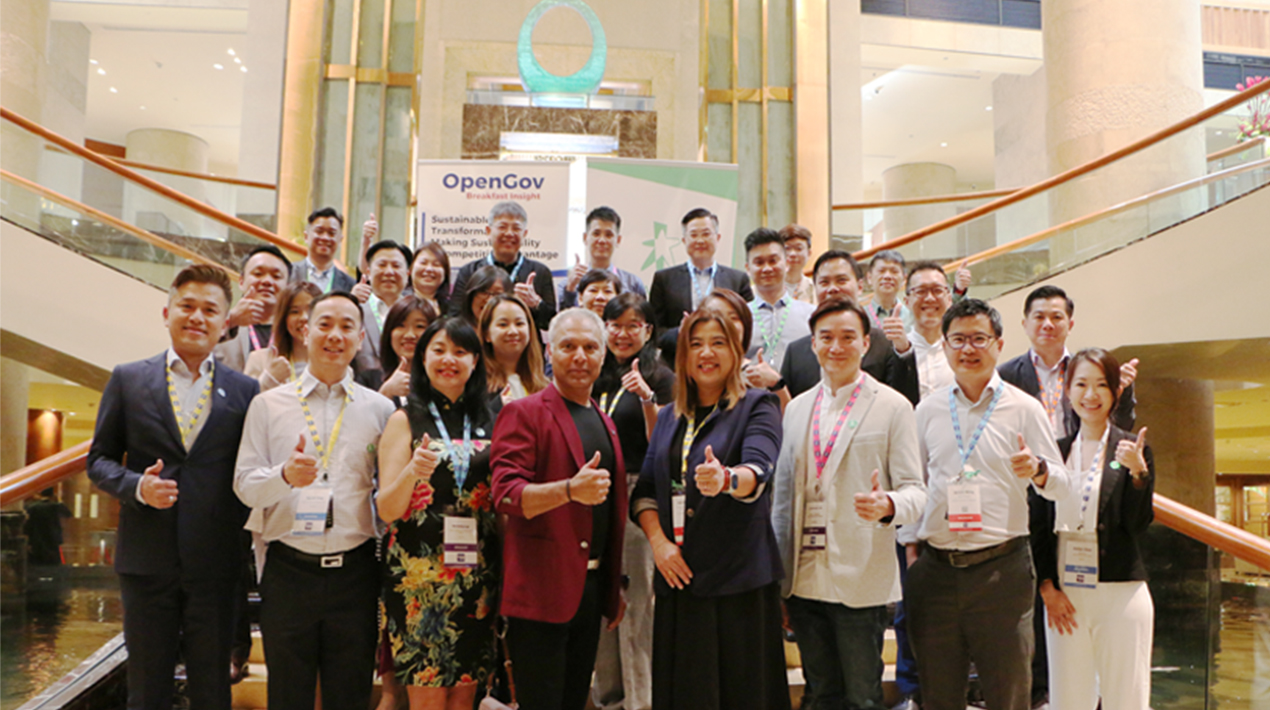
|
Getting your Trinity Audio player ready...
|
In recent years, sustainable development and environmental consciousness have surged in significance globally. Simultaneously, digital transformation has revolutionised industries, driving efficiency and unlocking new possibilities for businesses.
To actualise these targets and harness the full potential of these significant trends, an increasing number of companies are embracing Sustainable Digital Transformation (SDT). This approach involves integrating sustainability principles into digital initiatives, enabling them to achieve a competitive advantage while driving positive social and environmental impact.
Indeed, sustainability has evolved beyond a mere checkbox for companies’ social responsibility; it is now a strategic imperative for long-term success. Organisations increasingly recognise that embracing sustainable practices not only saves costs but also enhances their brand image and fosters trust among stakeholders.
Simultaneously, digital transformation is revolutionising how companies operate. By embracing digital technologies and reimagining their processes, organisations can optimise their operations, streamline workflows and increase efficiency across various departments
When coupled with sustainable practices, these two forces generate a powerful synergy that can transform industries and drive a paradigm shift in traditional business approaches. The combined impact of digital transformation and sustainability is reshaping how businesses function and paving the way for a more responsible and future-oriented business landscape.
SDT is rooted in the concept that digital tools can enhance environmental stewardship. For instance, the Internet of Things (IoT) simplifies resource management and tracking, leading to reduced waste and pollution. Smart energy grids optimise energy usage, while advanced data analytics identify opportunities for sustainable practices in supply chains.
In addition, digital transformation enables organisations to embrace the principles of the circular economy. Leveraging data analytics and artificial intelligence, companies can extend the lifespan of goods and services, promote reuse, and facilitate recycling. This approach not only benefits businesses economically but also addresses social issues and contributes positively to communities.
Incorporating sustainability into digital transformation can significantly enhance a business’s reputation and foster customer loyalty. Modern consumers, particularly younger generations, are increasingly conscious of the environmental and social impact of their purchases. They are more inclined to support and remain loyal to brands that demonstrate a genuine commitment to the environment and ethical practices.
While Sustainable Digital Transformation offers numerous benefits, it must be approached with careful consideration for it to succeed. Organisations should integrate sustainability into their core business plans and foster a culture that encourages responsible practices and innovative thinking.
Collaborating with stakeholders, including suppliers, customers, and local communities, is essential to creating shared value and addressing complex sustainability challenges effectively.
By cultivating a holistic and responsible approach to Sustainable Digital Transformation, organisations can not only achieve their sustainability goals but also foster long-term success and a positive impact on society and the environment.
The OpenGov Breakfast Insight on 26 July 2023 at The Fullerton Hotel Singapore convened decision-makers from Singapore’s public sector convened to discuss the latest developments in sustainable digital transformation.
Opening Remarks

Mohit Sagar, CEO and Editor-in-Chief of OpenGov Asia, believes the combination of digital transformation and sustainability provides a competitive edge, offering several key benefits. It simultaneously reduces detrimental ecological footprint and tackles community concerns, sets businesses apart, aids in compliance and fosters confidence with stakeholders.
It addresses environmental and social issues by enabling businesses to minimise their environmental impact and align with social standards and regulations. Secondly, it serves as a means to differentiate in a competitive market, attracting environmentally conscious customers, cultivating a robust brand image and earning the trust of stakeholders.
“To achieve business objectives, sustainable digital transformation involves merging digital tools with environmentally beneficial practices,” Mohit explains. “This includes utilising energy-efficient data centres, adopting paperless operations, and implementing green supply chains as prime examples of how digital innovation and sustainability can synergise.”
Initiatives encompass adopting advanced cooling systems and renewable energy sources in data centres, transitioning to digital-first operations and leveraging digital tools to monitor and enhance environmentally friendly supply chains.
Sustainable digital transformation offers organisations numerous benefits, including a competitive edge, cost savings from energy efficiency and waste reduction, meeting customer expectations for sustainable practices, enhancing regulatory compliance and risk management, and opening up access to new markets and business opportunities.
Combining digital transformation with sustainability initiatives enables companies to enhance their brand image, attract environmentally conscious customers, and drive business growth while contributing to a better world.
However, sustainable digital transformation can encounter challenges such as high up-front costs, cultural changes, and data privacy concerns. To overcome these challenges, businesses can avail of government incentives and grants, educate their workforce about sustainability and actively involve them, and implement robust cybersecurity measures.
Indeed, by exploring additional funding options, fostering a culture that values sustainability, and prioritising data security, organisations can navigate the challenges of sustainable digital transformation and unlock its myriad benefits.
For successful digital transformation, a methodical approach is crucial, involving several key steps. Organisations should begin by assessing their current environmental impact and establishing clear sustainability goals, such as reducing carbon emissions, minimising waste, or enhancing energy efficiency.
After establishing these goals, projects should be evaluated and ranked based on their potential environmental impact and return on investment (RoI) to optimise resource allocation and achieve optimal outcomes.
“In today’s business and environment landscape, the fusion of digital transformation and sustainability is not just a choice but a strategic imperative,” Mohit concludes. “As we prioritise responsible practices, we create a powerful synergy that contributes to making the world a better place for generations to come.”
Technology Insight

Chris Chan, the Head of Digital Services at StarHub, describes the green tech ecosystem as an intricate network of technologies, businesses, organisations, and individuals united in their mission to tackle environmental challenges and promote sustainable practices.
Further elaborating on the green tech ecosystem, Chris emphasises that its core revolves around three fundamental pillars: Sustainability, Digitalisation and Telco and ICT Services. These pillars are crucial components driving the development, adoption, and seamless integration of green technologies and solutions aimed at mitigating the impact of human activities on the environment.
Within the realm of sustainability, the primary objective is to foster collaborative efforts in upholding Environmental, Social, and Governance (ESG) policies. To achieve this, a range of services are offered, including consulting, energy audits, as well as the monitoring and management of energy, water, and the environment.
Additionally, the implementation of “smart hygiene” practices is also incorporated, ensuring a comprehensive approach to maintaining ecological balance while adhering to responsible and sustainable practices.
Chris reveals that Singapore aims to align its digital processes with its Green Plan 2030. This involves establishing a centralised data management system, custom KPI screens, and utilising predictive AI and ML to identify trends and patterns for smart insights.
Telco and ICT Services at StarHub are dedicated to leveraging the company’s robust and reliable connections to drive transformative change. The services encompass 4G/5G mobile connections, SD-WAN (Software-Defined Wide Area Network), Cyber Security, and MEC (Multi-Access Edge Computing). Through these offerings, StarHub aims to optimise connectivity and empower businesses and individuals with cutting-edge solutions to meet their digital needs effectively.
According to Chris, adopting environmentally friendly practices or “going green” offers numerous advantages for individuals, companies, communities, and the entire planet. These benefits positively impact society, the economy, and the environment, creating a win-win situation for all stakeholders involved. By embracing sustainability, individuals and organisations not only contribute to a healthier planet but also cultivate a more prosperous and harmonious world for current and future generations.
Some of the most significant ways that going green helps a company include reducing the impact of carbon taxes, enhancing the brand perception among consumers, and attracting and retaining talented employees.
The Green Tech Solution with an Integrated Data Platform fosters a smart and eco-friendly environment by enabling efficient data analysis, optimised energy management, improved surveillance capabilities, and streamlined operations management.
Chris highlighted several advantages, including:
- Smart Environment: By utilising appropriate sensors, data can be captured and analysed to detect potential issues early on. This enables timely preventive maintenance or corrective actions to be taken.
- Energy Management: The solution proactively collects data and utilises algorithms for optimisation. It automatically generates sustainability Key Performance Indicators (KPIs) required for Green Mark Certification.
- Surveillance System: Deploying cameras with video analytics, enhancing security measures. It can identify breaches, allowing for faster response times to detect violations such as breaches of social distancing or individuals not wearing masks, thanks to AI integration.
- Operations Management App: The solution integrates workflows, providing instant alerts and enabling remote incident reporting. It also facilitates the orchestration of business processes from different systems.
As an illustration, Chris offered the use case of a client wanting to seamlessly transition from indoors to outdoors while staying continuously connected. StarHub’s innovative plan involves employing 5G backhaul technology instead of conventional cables and power lines to support an outdoor WiFi solution, which will be powered by solar energy.
The strategy’s adoption of solar power aligns with the sustainability plan, offering quick and easy setup in any open area. The system gets information about how much solar power is made and stored in the battery. This information is then sent to their IoT Platform so that it can be watched and analysed. When the battery power is low, alerts are sent to the StarHub Workflow app to tell users what to do.
This technology enables the integration of additional equipment, such as CCTV cameras, to enhance area surveillance capabilities. Moreover, the infrastructure can be expanded to accommodate more devices within the same framework.
Such a forward-thinking approach aims to provide uninterrupted connectivity while harnessing renewable energy sources for a more sustainable and eco-friendly solution.
Chris presented another compelling use case, which involves digitising the process for the bus captain to check in and out passengers and ensure the vehicle’s compliance with regulations. StarHub’s plan entails providing each bus driver with a managed device containing a mobile app. The app is integrated with various internal programmes, including e-leave management. Using the app, the bus captain can efficiently check off tasks before and after work.
As part of the online check-in/check-out process, the app records the bus captain’s start and end times. Additionally, it enables the bus captain to request leave and make claims without the need to visit the office, streamlining the process and enhancing efficiency for bus captains while facilitating overall work management.
The use of paper was cut by more than 40% as a result of this approach. Buses lasted longer because preventive maintenance was done on time, and bus captains were better able to manage their time through remote access.
“Green technology solutions are critical in tackling environmental issues and promoting a sustainable future for the planet,” Chris reiterates. “Their significance arises from the critical need to reduce the effects of climate change, conserve natural resources and safeguard ecosystems.”

Lawrence Lim, Head of Enterprise Data Intelligence and Insights at StarHub, describes humanising change for sustainability as the integration of core values such as empathy, inclusivity, and collective responsibility into the implementation and promotion of sustainable practices.
“In a world facing pressing environmental and social challenges, it is crucial to recognise that sustainability is not only about adopting eco-friendly technologies and adhering to green policies,” he says. “It is also about embracing a profound transformation in our approach to change, making it people-centred and future-focused.”
According to a national survey, Singaporeans show a high level of awareness about climate change, but there is room for improvement in terms of the adoption and effectiveness of sustainable practices. The SG Green Plan embraces this, aiming to create a City of Green Possibilities by harnessing the collective power of ‘People’ and engaging the support and participation of ‘Business’.
By placing individuals at the core of this transformative journey and nurturing a sense of environmental responsibility, Singapore can lead the way towards a more sustainable and resilient future.
Furthermore, by encouraging businesses to integrate sustainability into their operations and promoting collaboration with the public sector, the city can accelerate its shift towards a greener and more sustainable economy, setting an example for the global community.
Lawrence believes in the creation of a platform that facilitates the exchange of sustainable value among stakeholders with shared green objectives, leveraging technology, insights, and government and community programs. A district’s “Green Board” assumes a vital role in fostering synergy and promoting collaboration between “People” and “Businesses” in their collective pursuit of sustainable practices.
The implementation of a four-step strategy serves as a motivating force for stakeholders, uncovering improvement opportunities and coordinating efforts towards accomplishing national Key Performance Indicators (KPIs). The four steps include District Awareness, Connecting with Mission, Discovery & Gamification, and Recommendation Engine.
The National “Green Board” was established as a visionary platform to foster progressive review, creativity, and innovation within government agencies. It is a transformative platform, utilising insights, collaboration, and innovation to effect positive governance change. Serving as a dynamic hub, it cultivates forward-thinking ideas and solutions to enhance the connection between people and businesses.
Implementing comprehensive tracking mechanisms, and upholding sustainability, the Green Board energises government agencies to pave the way for a brighter and more sustainable future for the nation and its citizens. Through it, agencies are empowered and mandated to monitor the success of their initiatives by harnessing the power of technology.
Lawrence believes that a dedication to sustainability offers numerous advantages, encompassing environmental, social, and economic benefits. Embracing sustainable practices and policies fosters the development of a more resilient and equitable society while preserving the planet for future generations.
Sustainable practices promote the efficient utilisation of resources like water, energy, and materials, leading to long-term cost reductions and increased productivity. Additionally, sustainability initiatives address social issues, fostering more inclusive communities and improving public health.
“By embracing sustainability, we embrace a path to a brighter, more sustainable future for all,” explains Lawrence. “By stimulating innovation and technological progress, sustainability promotes global cooperation and harmony, leaving a positive legacy for those who come after us.”
In Conversation With: Navigating the Path of Sustainable Digital Transformation

Veronica Lai, Chief Corporate & Sustainability Officer of StarHub, stressed the significance of integrating digital transformation within the organisation. Nonetheless, StarHub recognises that this undertaking demands a steadfast and persistent commitment, as digital transformation is an ongoing journey rather than a one-time event with an immediate endpoint.
StarHub has proactively embarked on the journey towards digital sustainability, recognising its paramount significance. This pivotal realisation has led them to understand that to ensure the enduring success of digital transformation, it must become an integral part of the company’s culture, encompassing all stakeholders such as employees, business partners, and clients. Taking decisive action, StarHub is committed to fostering a collaborative environment where the values of digital sustainability are embraced individually and collectively.
They have implemented strategic measures for sustainable digital transformation, exemplified by their adoption of green technology. They are committed to integrating green technologies into their operations to reduce their environmental impact, with investments made in energy-efficient utilities and data centres.
StarHub encourages the use of technology as a powerful means to achieve these goals. Harnessing its potential to drive positive change and promote a more sustainable future, it continuously improves and expands its range of digital offerings. Their portfolio includes state-of-the-art and eco-conscious digital solutions designed for businesses, such as cloud services, collaboration platforms, and Internet of Things (IoT) solutions.
StarHub actively supports sustainability endeavours by forming alliances and partnerships with institutions and organisations focused on social and environmental issues. By collaborating with these stakeholders, they contribute to sustainable development objectives.
“StarHub is dedicated to upholding the sustainability of digital transformation and fostering a beneficial impact on the world’s environment and society through these initiatives,” Veronica says.

According to Nelson Liew, Group Director at JTC Corporation, the private sector holds a crucial responsibility in supporting the public sector’s efforts to raise awareness about the SG Green 2030 national vision and its goals for achieving sustainable digital technology transformation.
To effectively accomplish the government’s national key performance indicators, it is imperative to leverage the expertise and resources available within the private sector. By collaborating closely, both sectors can work hand in hand to drive the realisation of sustainable digital initiatives and contribute significantly to Singapore’s green and technology-driven future.
JTC Corporation has invested in sustainable digital transformation through various means. They have integrated digital technologies to enhance productivity and efficiency in their operations. Notably, the implementation of digital technologies such as the Internet of Things (IoT), big data analytics, and integrated management systems has significantly improved the administration of industrial infrastructure and facilities.
“JTC Corporation has made investments in digital infrastructure to increase corporate connectivity and accessibility in industrial locations,” he reveals. “The company can streamline processes, cut expenses, and enhance the user experience for its services by utilising this technology.”
JTC Corporation has established a reliable communications network that utilises fibre optic technology, facilitating fast and efficient data transmission between businesses and other stakeholders. This robust connectivity empowers businesses to interact swiftly, access digital resources, and bolster their operational effectiveness, contributing to overall efficiency and effectiveness in their endeavours.
In its digital transformation journey, JTC Corporation prioritises the incorporation of green technology. To mitigate the environmental impact of their operations, they have embraced eco-friendly practices, including the utilisation of renewable energy and sustainable waste management strategies.
JTC Corporation remains committed to spearheading sustainable digital transformation. By supporting international initiatives aimed at environmental conservation and reducing the carbon footprint of businesses, they place a strong emphasis on promoting environmental sustainability.
Their dedication lies in enhancing both the industry and the environment while adding value for businesses in industrial areas through the implementation of digital technologies, infrastructure investment, adoption of green technology, and fostering external collaborations. By embracing these initiatives, JTC Corporation aims to drive positive change and create a more sustainable and thriving ecosystem for businesses and the community at large.
“Every sector can help to create a more sustainable future by working together and taking ownership of sustainability activities,” Nelson is convinced. “In the end, society must take collective action and participate in creating a sustainable future.”
Closing Remarks
Mohit highlighted the crucial importance of technical cooperation in sustainability, emphasising its role in achieving and realising sustainable goals on a larger and more impactful scale. By fostering collaborations among diverse expertise, resources, and perspectives, these efforts effectively address complex environmental challenges.
Moreover, partnerships in technology sometimes entail governmental and private-sector cooperation. These public-private partnerships (PPPs) present an exceptional chance to combine the effectiveness and innovation of the private sector with the capacity of the public sector to advance socioeconomic and environmental goals.
Ultimately, any technological collaboration plays a vital role in scaling up solutions to a global level, maximising their impact, and effectively addressing worldwide environmental challenges such as pollution, resource depletion and climate change.
By leveraging collective knowledge, resources, and technological advancements, these collaborations enable organisations to tackle these pressing issues more comprehensively and make significant strides towards a sustainable and healthier planet for future generations. Communities become more resilient to critical events and environmental concerns can be allayed.
“Bringing together diverse perspectives, expertise, and resources, these partnerships foster creativity and cross-fertilisation of ideas, leading to more effective and holistic solutions,” Mohit concludes. “Collaboration can discover fresh and complementary solutions that might not have been obvious in individual initiatives.”
















